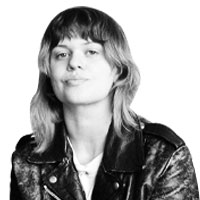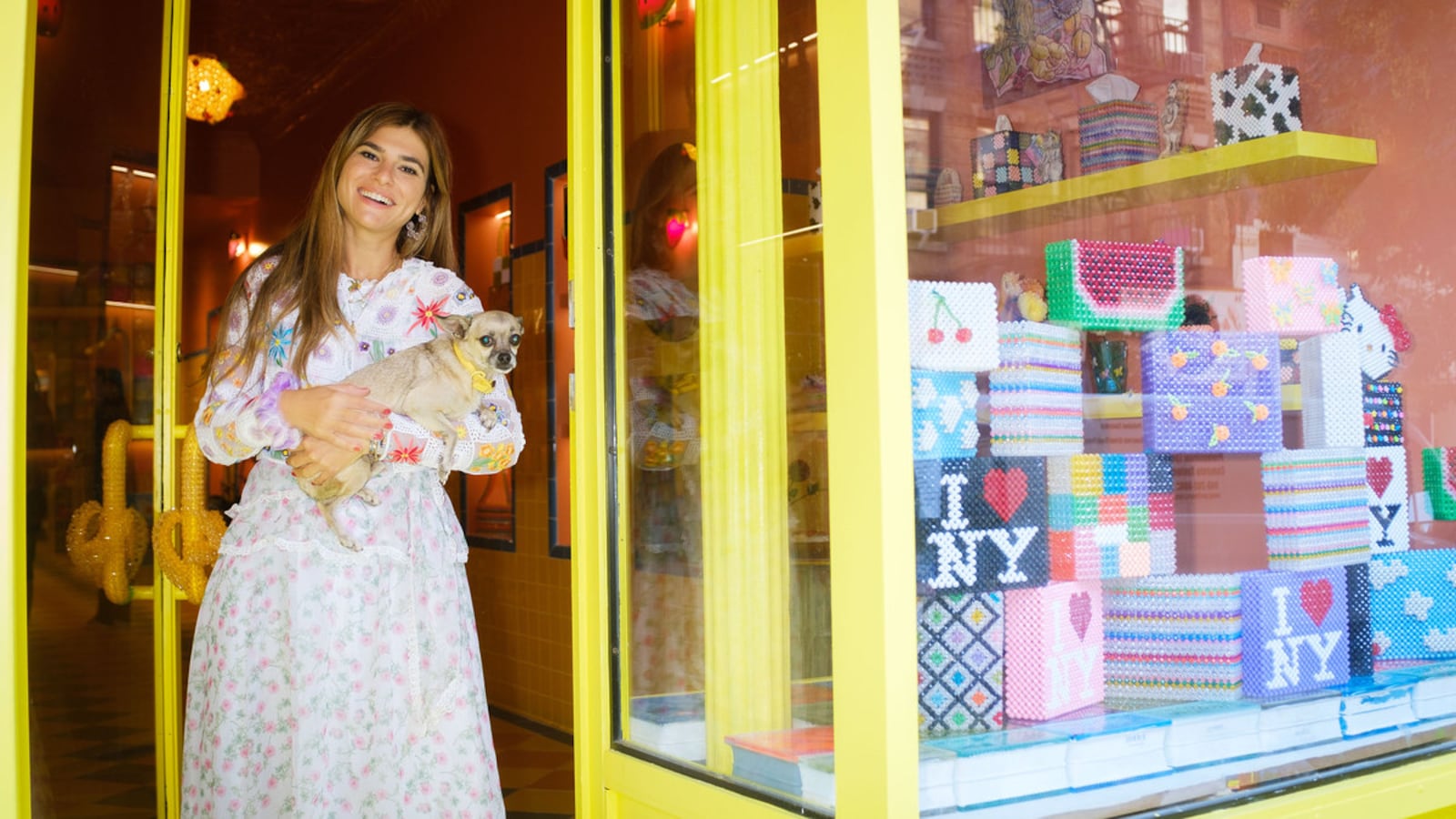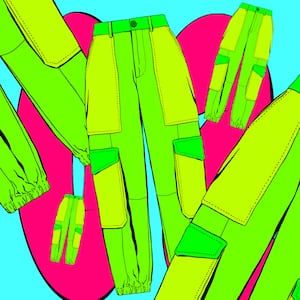If you’re a certain kind of young, lively, professional New York woman, you’re aware of the brand Susan Alexandra’s distinctive accessories even if you couldn’t name them: the boxy, beaded, sometimes fruit-shaped handbags exploded onto the scene a couple of years ago, representing a fresh, rainbow-hued alternative to the deeply serious, black leather offerings favored by Balenciaga or The Row.
Gigi Hadid was spotted rocking a rainbow-beaded Susan Alexandra bag on vacation in 2018, but this brand also isn’t just for the girls: iconic millennial lothario Pete Davidson has a custom Susan necklace that spells out his first name (as if we didn’t already know it). There’s a summer camp, friendship bracelet vibe to much of the brand's output.
“I think Susan’s stuff is very relatable,” New Yorker staff writer Naomi Fry, who modeled a beaded Susan Alexandra bag on her head for the brand’s 2020 bat mitzvah-themed fashion show, told The Daily Beast. “It appeals to the very core part of us that loves shiny, sparkly, beautiful things. It reminds me of how I felt when I’d go to the mall and see Barbies, and I just wanted everything.”
As of fall 2021, you can meander over to the Susan Alexandra flagship store on Orchard Street in Manhattan—the place feels rather like stepping inside a girly Lego house—and shop for chunky Zodiac sign necklaces, earrings, card holders and planters.
Susan Korn, the designer behind the eponymous brand, could be characterized as an overnight success long in the making. The granddaughter of a Holocaust survivor, she grew up in Columbus, Ohio, with a stalwart eye for whimsy and a love for bright colors.
“I’m pretty relaxed with my observance to Judaism, I love Jewish comedians and Jewish culture and I love the food, and I just love the warmth of it,” Korn told The Daily Beast.

Nevertheless, Korn shared that Susan Alexandra’s collection of quirky, lighthearted Judaica, a line that includes jewelry, Mezuzahs, and fruit-shaped dreidels that the brand launched in November of 2022, was “probably our most successful collection launch ever.”
“It wasn’t something where I was like, ‘I’m gonna be a Judaica jeweler,’ but I felt that there was so much opportunity there,” Korn said. “I want to feel passionate about everything I create, and I felt that that was something I could really sink my teeth into.”
“Another thing about Susan that I’m always impressed with is how she never stops having ideas,” Fry added. “It’s like her brain is a jewelry box that stuff keeps spilling out from.”
Though she’d been making beaded jewelry since 2014, her journey towards insider accessory stardom really kicked off when, wandering through Chinatown one day in 2017, she happened upon a shopfront that wasn’t really a shopfront at all.

Susan Alexandra purse.
Johnny Kompar“I was walking my dog in Chinatown, which is actually where my studio still is, and I happened upon this little hole in the wall,” Korn said. “You couldn’t even call it a store, it was more like a room with a glass door that you could see through. I stopped in my trucks, because I saw that inside this little room like a closet storefront were bags and bags of beads. I was just magnetized to go in and I go in, and there’s a woman working there and she’s crocheting, or doing something with her hands with the beads.”
The woman didn’t speak English, but her son managed to translate for Korn.
“I was like, ‘Could she make something that I design?’” Korn said. “They talked back and forth and she said yes, and handed me a little Post-It and a pen. And I sort of sketched something out and I pointed to the bags of the different colors of beads, and they told me to come back in a week. I came back in a week and she’d made the thing that I designed, which was a watermelon-shaped handbag. I was blown away and it was beautiful. I just put the bag on my Instagram and even though I had already been making jewelry for years, I had never received such an intense response from people before.”
Years later, that same woman still manufactures bags for Korn under the umbrella of her own business. The designer’s enterprise has multiplied exponentially, and as Korn looks towards 2023, her goals for the brand are ironclad; she even recently dipped her toe into the metaverse fashion scene via a collaboration with Coachella.
“I’m really trying to create a lifestyle brand,” Korn said. “I want to have a brand like a Betsy Johnson or a Ralph Lauren. People created these brands that encompass so much more than one piece; you know, you don’t think of one thing from Betsy or one thing from Ralph. You think of their whole life, so I always want to create with that in mind.”

I mention offhandedly to Korn that I’d love to wear an avant-garde beaded top, and she swivels her phone around excitedly to show a bright yellow cropped tunic dangling from the rack.
Laura Regensdorf, beauty director at Vanity Fair, profiled Korn in December. “When people talk about design with a humorous bent, the word irreverent usually comes into play, but with Susan Alexandra, it’s less about irony and more about joy,” Regensdorf told The Daily Beast. “Almost reverently so. Even a menorah resembling a row of nail polish bottles (seen at her Judaica launch event) speaks to the importance of community—whether a teen manicure party or Hanukkah dinner.”
This past September, Korn threw her Susan Alexandra fashion week party at New York’s Comedy Cellar and invited a host of raucous comedians, including SNL’s Chloe Fineman, Sarah Sherman, Robby Hoffman; the intent was clearly to throw lighthearted sunniness into the scowling faces of every chain-smoking Condé Nast employee snapping at her friend for mispronouncing Comme des Garçons.
“There was such warmth” at the Comedy Cellar event, Regensdorf said, “even among people who might self-identify as jaded fashion types. It’s disarming, in a way, this sparkly, exuberant world that Susan has created. It tiptoes up to fashion, but anyone can play.”
“There’s something to be said about the fact that people are resonating with things that are so colorful and funny and different, and there’s a childlike whimsy to everything I do,” Korn said. “I think it’s really special to have that sort of niche.”
However, none of this would be possible had Korn not suffered an emotional breakdown in her twenties on the NYC subway (who hasn’t) while feeling frightened, underemployed, unmoored and like she was falling behind. Unsure what she wanted to do with her life, while in the depths of her despair, she had something close to a vision.
“The epiphany that I had on the subway, and the way I was able to talk myself down, was telling myself that if there was a way that one day I could create a space for people who are like me—very lost, very tender and very vulnerable—and create jobs or give people chances,” Korn said, “I thought, ‘Maybe this is why I’m meant to feel this way.’”







